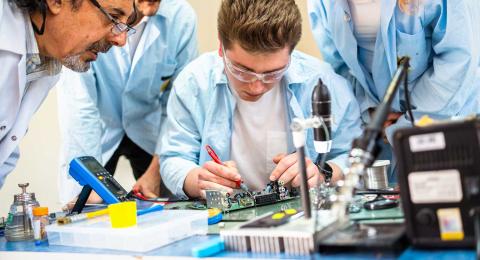Calcul haute performance, simulation
The CHPS master is a professional and research-oriented program that trains high-level scientific professionals in two key technological fields: high-performance computing and digital simulation. Students will gain skills in high-performance computing/AI programming, modeling and simulation, parallel computing, and big data analysis.
The "High Performance Computing, Simulation" (CHPS) master's program is set within the context of rapidly evolving computer architectures (multicore, GPU, specialized accelerators) and a growing demand for precise modeling in various sectors (artificial intelligence, mechanics, finance, life sciences, energy, etc.). The main goal of this program is to provide students with a solid foundation of theoretical knowledge and practical expertise in high performance computing (HPC) and simulation, so they can contribute to technological and scientific advances in both public research and industry.
This program consists of four semesters of study grouped into two years: a first year (M1) and a second year (M2) with two tracks: "High Performance Computing Simulation (IHPS)" and "Modeling and Simulation for High Performance Computing (MSCHP)".
Information
- Efficiently exploit high performance architectures for numerical simulation and massive data.
- Model and simulate physical phenomena using appropriate mathematical and computational tools.
- Design and produce software for high performance simulation.
- Evaluate HPC software performance using key metrics in order to optimize and parallelize them.
- Discuss challenges and be able to contribute to the large-scale simulation ecosystem.
- Develop parallel and distributed algorithms to handle massive problems.
Learning outcome targets
The "High Performance Computing, Simulation" (CHPS) master's program aims to train high-level scientific professionals capable of designing, developing, and optimizing numerical solutions based on parallel computing and numerical simulation technologies. The CHPS master's program builds on the University of Paris-Saclay's ecosystem of excellence and is supported by the University of Versailles Saint-Quentin-en-Yvelines (UVSQ), École Normale Supérieure Paris-Saclay (ENS-PS), and INSTN/CEA.
The professional placement rate is excellent. Upon graduation, alumni pursue positions within key companies in computing and simulation or continue with PhD studies in prestigious research laboratories.
Main Career Paths Academic Sector: Researcher, professor-researcher, or research engineer. Industrial Sector: Manager/numerical engineer, statistician, or computer scientist expert in the entire chain of high performance computing and simulation.
The master's program benefits from its proximity to Ter@tec, Europe's leading technology park dedicated to HPC and simulation, enabling direct collaborations with companies (ARM, AWS, CEA, CGG, Eviden, Intel, NVIDIA, Paratools, SiPEARL, etc.) and research laboratories (LI-PARAD, MDLS, Centre Borelli, ECR). These partnerships foster engagement with industrial challenges and implementation of concrete projects, particularly through HPC hackathons where CHPS students have distinguished themselves. The master's program is also part of the HPC master's network with monthly joint seminars and shared internship and job opportunities.
The program aims for multidisciplinary expertise:
- Mastery of advanced programming techniques for multicore architectures and accelerators (CUDA, OpenMP, MPI, etc.) and introduction to AI methods for massive data processing.
- Design and optimization of simulation algorithms, coupling between mathematical models (numerical analysis) and applications.
- Expertise in hardware and software parallelism, performance evaluation, code profiling and optimization, as well as model reduction and multi-scale methods.
- Skills in analyzing massive data from simulations or experimental measurements.
The M1 offers multidisciplinary training combining mathematics (numerical analysis, modeling techniques) and high performance computing (parallel programming, scientific computing, high performance architectures). It begins with a foundation course allowing all students to acquire common groundwork for HPC.
The M2 begins with a core curriculum common to both tracks providing in-depth knowledge of HPC topics: Advanced programming of multicore architectures and hardware accelerators, performance evaluation, numerical programming methods, and an introduction to Artificial Intelligence, data processing, and machine learning.
The **IHPS track** strengthens specialization in optimizing parallel code writing (Architecture and Code Optimization, Advanced Compilation), developing software for scientific computing, and provides exposure to quantum computing and modeling of physical phenomena at microscopic or nanoscopic scales.
The **MSCHP track** focuses on modeling and simulation aspects and presents both phenomenological models, the mathematical models (PDE discretization) that derive from them, the numerical methods (domain decomposition, model compression, AI) that enable solving these equations, as well as their simulation.
The curriculum is strongly project-oriented, with project-based courses throughout both years, and concludes with a 5-6 month internship in a research laboratory or industrial RD.
Target audience
This master's program is aimed at students holding a degree equivalent to a bachelor's in Computer Science, a bachelor's in Mathematics, or a bachelor's in Physics. It is also possible to apply directly to the M2 for students who have completed an M1 or the 4th year of an engineering program.








